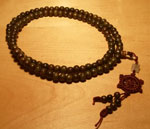![]() Rev. Ron, is there significance to the number of beads in an ojuzu?
Rev. Ron, is there significance to the number of beads in an ojuzu?
![]() Well, first, the proper name for what many of us refer to as the ojuzu, is actually the onenju.
Well, first, the proper name for what many of us refer to as the ojuzu, is actually the onenju.
The closest translation of onenju is “meditation beads” Ojuzu, on the other hand, translates to “counting beads.” And Jodo Shinshu does not count anything (such as the number of times a person says Namo Amida Butsu).
But whichever name you use, you should treat these beads with the utmost respect at all times. At home, it should be kept in a special place, such as in a drawer near the family altar. At other times, the Buddhist follower should carry the onenju in the purse or in the coat pocket, so that it will always be available.
During Buddhist services, the onenju should be held in the left hand when being carried and should encircle the hands during gassho, symbolizing Oneness.
A full strand of onenju beads has 108 beads (more later). Of those beads, there are three that are different in size and color. When the onenju encircles both hands in gassho, one of these different beads sits at the midpoint of one hand; this is the “father” bead. At the midpoint of the other hand is the “mother” bead. These two beads are reminders to us that each of us has parents. The third bead that is different than the rest is found where the tassel is formed; it is the “Amida” bead and ties everything together.
So, if you are curious as to why the onenju has 108 beads, yes, there is a reason. Get your math hats on, and we’ll explain:
- We humans have five senses—sight, sound, smell, taste and touch. Those 5 senses plus consciousness equals 6 senses.
- Each of those 6 senses can be perceived as: good, bad or neutral. (6 x 3=18).
- Each of those 18 good, bad and neutral senses can, in turn, be designated positive or negative. (18 x 2 =36)
- And each of those 36 positive or negative good, bad and neutral senses could occur in: the past, present or future (36 x 3=108).

Onenju
The number 108, then, represents the 108 human passions. And the onenju reminds us that we, as humans, are often roiling in these 108 passions.
In Buddhist tradition, we call upon the Buddha, the teachings and our community to help us to overcome these 108 human passions.
